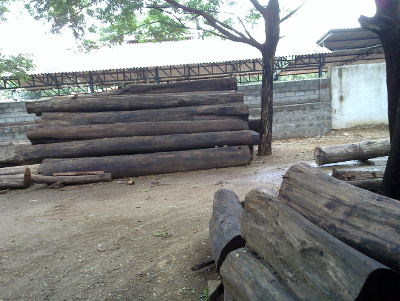During the latter part of the governorship of Lachlan Macquarie and for some ten years afterwards there was a gang of convicts cutting timber in the forest around today's suburb of Pennant Hills. The establishing of a gang hereabouts had a rather interesting background in that it was in the main influenced by events taking place overseas. After 1789 England was at war with France on and off until 1815. The British dockyards were desperate for shipbuilding timber because Napoleon's fleet had blockaded the Baltic Sea preventing the importation of timber from Scandinavia. In England many of the commons had been enclosed but no-one had bothered to replant the oak trees which had been cut from them.

|
In 1804 the Admiralty suggested that suitable timber for shipbuilding might be found in the new colony of New South Wales. Consequently timbers were sent back on the 'Calcutta' in '1805 and a timbergetting gang was sent up the Lane cove River to cut timber. Until 1810 convicts being transported to the colony were few. There were few skilled workers.
Macquarie visited the sawpits at Lane Cove in 1810 and suggested they be moved to a place where the timber was more plentiful. However the Lane Cove sawpits remained until about 1815 when they were moved to Pennant Hills. Unfortunately for Macquarie the Napoleonic Wars had ended and the British government was no longer requiring the timber. As the soldiers returned after the war unemployment rose, and as a result more and more convicts were sent to the Colony. In 1817 the Hawkesbury River flooded and some 500 convicts were returned to the government because the farmers of that district could no longer afford to feed them.
Macquarie took probably the only course open to him to greatly expand the public works programme. New buildings were planned for Sydney, Parramatta, Liverpool and Windsor. They would all be complete within a couple of years and would be needing timber.
At Pennant Hills convicts felled the trees and split the timber for slabs, posts, laths and shingles. Timber was sawn for beams, floorboards and scantling. The leftovers were burnt by the charcoal burners for the blacksmiths in the Lumber Yard. Basket makers made standard sized baskets to carry the charcoal. Some men worked as stockkeepers looking after the bullocks, many of which had recently been tamed from the wild cowpastures herd. Bullockies drove the bullock jinkers and carts down to the Pennant Hills wharf on the Parramatta River (today at the end of Wharf Road, Ermington). The timbergetting establishment had its own blacksmith, wheelwright, hutkeeper, sawpit clearer, tailor, shoemaker and barber. It had its own chapel where divine service was performed by the convict school teacher who taught the convicts to read and write in their own time after work.
The chapel building was a unique gesture in cooperation between the Catholic superintendent and a Wesleyan missionary. It stood in what is now Oxford Street, Epping. The other unique thing about the place was the strike that occurred there in 1819. Rations were increased and the sawyers were required to do extra work. They refused to do it. Three weeks later Macquarie sent George Druitt up to Pennant Hills to ask the men to go back to work. They still refused and two men argued that nothing but the old amount of work would be done. Reluctantly, Macquarie had the two men flogged. In England at the time, meetings aimed at improving the lot of workers were illegal. The 'Combination Act' even outlawed Friendly Societies. It was feared that such groups could lead to the overthrow of the State as had happened in France. Striking in the British Army or Navy during this period earned the death penalty. But in Pennant Hills the convicts got away with it. There were two main reasons for this. They were the only skilled group of sawyers in the colony at the time. Macquarie had nowhere else to turn for his timber. The other reason was that many of Macquarie's buildings were reaching the stage where the root trusses and shingled roofs were being put on.
The floor boards were being put in and the fences were being erected. Moreover the Commissioner of Enquiry, J.T. Bigge was in town. Macquarie had to complete his buildings to impress his visitor.
After Macquarie's departure in 1821 Governor Brisbane began to wind down the timbergetting establishment. Bigge had recommended that convicts should be employed by farmers who lived up country (away from the pubs of Sydney, Parramatta and Liverpool). During the 1820's number of men at Pennant Hills were kept down to a minimum. The gang was finally disbanded after a change of government in England recommended that in future, all Public Works be put up for tender.
